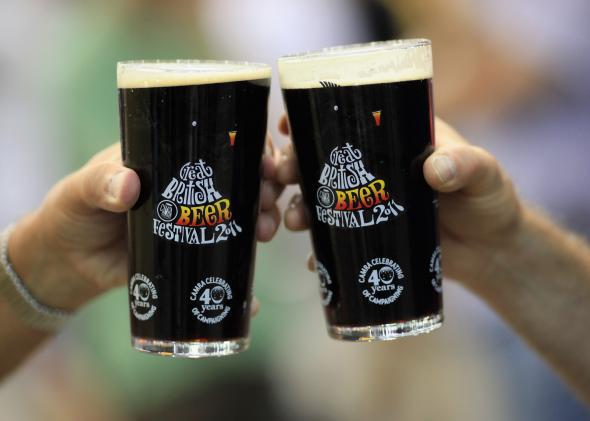“Drynuary” is a very stupid name for a very smart tradition: abstaining from alcohol for the month of January. Though the practice of periodically abstaining from alcohol is probably as old as alcohol itself, the term “Drynuary” was coined in 2007 by John Ore, who has written about the practice (often collaboratively with fellow writer Jolie Kerr) for the Awl, the Hairpin, and, this year, Deadspin.
Over the years, Drynuary has attracted devotees and, inevitably, spurred a backlash. Yesterday, the New York Post published an essay by Tim Donnelly called “Here’s why that no-drink January trend is totally pointless.” Donnelly’s argument boils down to two main points: First, that January is the most depressing time of the year, and therefore the time when drinkers most need the soothing effects of alcohol. Second, that abstaining from alcohol in January leads to binge drinking in February. (This point has been made previously by medical professionals in a couple of British tabloids.)
Both of these arguments are flawed. Before I explain why, I should divulge that I am doing Drynuary this year for the second time. (I decided to do it last year because I was trying to be as healthy as possible in preparation for a medical procedure—and I liked it so much last year that I decided to do it again this year.)
The claim that Drynuary is pointless because January is depressing obviously depends on one’s own experience with the month in question. Some wackos don’t find January depressing at all! I personally tend to get super-depressed in January. But I’ve found that abstaining from drinking—along with doing stuff like light therapy—helps stabilize my mood. If Donnelly finds that alcohol helps him get through January, that’s great, but his experience is hardly universal. (I should mention that clinical depression often coincides with alcohol abuse, but the causational mechanism isn’t clear.)
The idea that Drynuary leads to subsequent binging or that it exacerbates extant drinking problems is more pernicious. Donnelly writes that Drynuary “leads to bingeing as soon as the calendar hits Feb. 1, say experts.” One such “expert,” a British TV doctor named Christian Jessen, wrote last year in the Daily Mail, “most people are giving up alcohol in January just so they can go back to boozing with a vengeance in February.”
Jessen doesn’t cite any research to back up this claim, so I must assume his only source is our society’s unfortunate tendency to think about drinking in dichotomous terms: Either you have a healthy relationship with alcohol, or you have a serious drinking problem. As Ore, the original Drynuary guru, told me in an email, “The sentiment seems to be that a) if you MUST abstain for a whole month, you clearly have a problem with alcohol and b) Drynuary must be the ONLY time of year when you aren’t doing keg stands (the corollary to the binge-drinking claim), so you clearly have a problem with alcohol.”
In the real world, though, drinking is not so cut and dry. Yes, there are people who are physically and psychologically dependent on alcohol or who regularly endanger themselves by drinking too much. But there are many more people who generally drink moderately but occasionally experience alcohol-related problems.
As Gabrielle Glaser, the author of a book about women and drinking, explained in a recent New York Times op-ed, our “one-size-fits-all approach to drinking problems” does these people a disservice:
Research shows that many problem drinkers—those who repeatedly drink more than they intend, sometimes have physical or psychological consequences from overdrinking, and may have difficulty controlling themselves—could benefit from brief interventions and practical advice about how to set better limits and change their drinking by cutting back.
Glaser argues that Alcoholics Anonymous doesn’t give most problem drinkers the tools they need to manage their drinking in a healthy and realistic way, and that many people would be better off using the approach laid out by Moderation Management, a program that helps people take control of their drinking by monitoring and limiting their alcohol intake.
How is this relevant to Drynuary? One of the steps of the Moderation Management program is to abstain from drinking for 30 days. The Moderation Management guide suggests that people use this period to practice saying “no” to offers of alcohol, to learn how to handle urges to drink, and “to study various techniques to help keep your drinking moderate when you do resume drinking.” I obviously cannot speak for everyone who does Drynuary, but this type of impulse control and reflection is exactly what I find useful and heartening about the month-long dry spell.
Another key aspect of Moderation Management is that it depends on self-determination—the program “empowers individuals to accept personal responsibility for choosing and maintaining their own path.” The same is true of Drynuary: No one can make you do it, and you do it only if you really want to. (“There’s no zealotry here,” says Ore. “If you don’t do Drynuary, who cares?”) This is why I find the tsk-tsking of the naysayers at the New York Post and the Daily Mail—not to mention the vehement reader backlash to Glaser’s New York Times op-ed—so odd. Then again, Drynuary and Moderation Management don’t fit into the either-or framework so commonly applied to drinking problems—and gradations of gray can feel threatening when people are so used to thinking in black and white.
